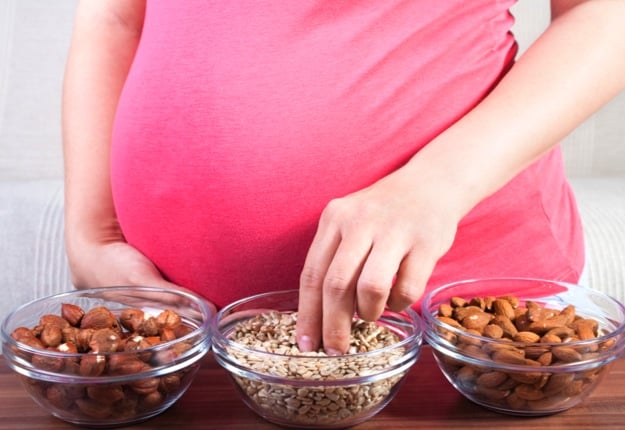You are what you eat and, when you’re eating for two, a healthy balanced diet is more important than ever.
Fresh fruits, vegetables, eggs and lean meats will nourish your body with vital nutrients to help keep you and your baby happy and healthy. Naturopath, Teresa Mitchell-Paterson shares her insights into boosting the health of your trolley for a healthy pregnancy.
Leafy green vegetables
Vegetables such as spinach, broccoli, lettuce, and avocado contain folic acid that can help prevent neural tube defects. Green machine veggies like kale, brussels sprouts and bok choy are rich in antioxidants and are considered to be some of the most nutrient-dense foods on earth.
Dairy
Foods including yoghurt, milk and cheese contain iodine – a mineral thought to prevent birth defects. Iodine is an important component of the thyroid hormone, thyroxine (T4), required for normal growth and metabolism.
Thyroid hormones are essential for normal growth and development of tissues, including the central nervous system. They also play an important broader role in the maturation of the body as a whole. Thyroid hormones are also integral to the production of energy and oxygen consumption in cells which help to maintain the body’s metabolic rate. Other foods high in iodine include seaweed and eggs.
Lean meat
Lean meats such as skinless turkey and chicken, and fat-trimmed pork are fantastic sources of zinc – a mineral important in reducing the risk of pre-term births. Zinc can help boost the immune system, help to synthesise proteins and DNA in cells, and also acts as a catalyst for a range of enzymes. Zinc can also be found in seafood, legumes nuts, seeds, milk and wholegrains.
Legumes
Legumes, such as baked beans, chickpeas and lentils are rich in iron – a mineral that helps to reduce the risk of low birth weight. Our bodies use iron to carry oxygen around in red blood cells. To support you and your baby’s growth, feed your body more iron to help it produce more healthy blood.
Other iron-rich foods include red meat, leafy greens, and iron enriched cereals. It’s important to take all non-meat sources of iron with sources of vitamin C such as citrus and kiwi to enhance the absorption of iron in your body.
Vitamin D supplements
Low levels of vitamin D are common in pregnant women. In pregnancy, vitamin D may also increase birth weight. While vitamin D can be found in foods such as oily fish and milk, very large amounts of consumption are required to obtain minimal amounts of the vitamin.
Low levels of vitamin D in children and adults have been linked to the development of many illnesses. Ask your healthcare practitioner before taking vitamin D or other supplements.
If you feel you’re not consuming enough of the foods mentioned in this article it might be a good idea to discuss this with your healthcare professional.
Teresa-Mitchell Paterson is a qualified Naturopath and Nutritionist for Eagle Natural Health. Teresa has a long history as a Naturopath spanning over 20 years and is educated to Masters Level. Her assistance in the treatment of chronic illness comes from a solid knowledge of human biochemistry, physiology and natural treatment protocols. As an educator she dedicates a portion of her time keeping up with the latest treatment protocols to assist patient and students alike.




















-

-
-
june11 said
- 16 Jun 2017
-

-
-
Ellen said
- 24 May 2017

Post a comment11:35 pm
7:55 am
To post a review/comment please join us or login so we can allocate your points.